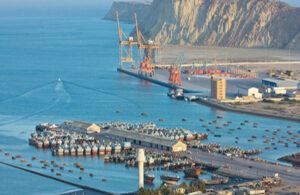Newspaper Article 03/01/2019
The China-Pakistan Economic Corridor (CPEC) is an economic initiative aimed at promoting trade and regional connectivity. The environment, in which CPEC will operate has opportunities, the states through the corridor will link up and fulfill the energy needs. However, there are existential challenges to the corridor, the threat of terrorism, the situation in Afghanistan and regional peace make the terrain difficult. The coming of CPEC in an environment having extremist tendencies offers a new trend of connectivity and cooperation. CPEC can be termed as the outcome of regional imbalances, purported by the transnational challenges. Pakistan and China, the regional countries behind the initiative through a collaborative framework want to strengthen their cooperation in the fields of trade, energy security and technology. The growth pattern of both the countries may vary widely. But both the countries have progressed and defied odds in one way or the other. China has an economic muscle, and as evidenced from upcoming Belt & Road initiative, the East Asian player has progressed beyond the regional sphere. Pakistan has fought back militancy and is still stable, led by a democratic government. Despite the short comings because of economic situation and governance issues, the country continues to move forward. Thus, both the players have stood up against the odds, and have contributed towards regional peace.
The work on CPEC is in progress. There are certain segments (within and outside) skeptical about the development projects. The detractors of CPEC have tried to project that the corridor would benefit more China and will entangle Pakistan with economic woes. The perception that CPEC is an exploitation of Pakistan; the trade route will benefit more to the outsiders and the locals will be denied the economic benefits is part of a simmering campaign to pollute the Pakistan-China bilateral cooperation. Looking at the job potential in backward provinces and the human resource indicators, Pakistan lacks in these areas. However, once the development work is in progress, through joint ventures with Chinese companies, Pakistan people can be trained. This will open up the provinces to the outside world and the people will also have an opportunity to improve their skills.
Pakistan and China economic cooperation under the framework of CPEC is likely to broaden. Both the countries have devised an “action plan” to cooperate in agriculture, education, port development and maritime sector. The agricultural cooperation between the Xinjiang Agriculture University and the University of Agriculture, Faisalabad is already in place. China will invest US $ 200 million in Pakistan’s seafood, steel and agriculture sector to boost bilateral business. The mining sector is also likely to flourish. Balochistan is rich in mineral resources. These economic activities will promote micro, medium and small sized industries, thereby, opening up job prospects for local population. Moreover, with Chinese goods in local markets, the local industry will have to catch up with foreign standard, thereby, it will enhance the quality of products. This competition will also introduce the local entrepreneurs to other markets. At the regional front, the CPEC offers optimism to regional players, as the connectivity will provide access to energy resources and open up prospects of trade cooperation. Gwadar seaport will be a trading hub for the adjoining regions and countries. However, the competing trends at the regional front has made certain quarters hesitant to the corridor. India has explicitly voiced concern over CPEC, which is in line with New Delhi’s obsession towards Pakistan.
CPEC is a reflection of the present day realities, it foretells the significance of economic prowess in battling the transnational challenges and threats. The claimants of a weak Pakistan need to have a ground look; Pakistan has fought back the disgruntled elements at home and at the regional front. CPEC is a reality, and it will bring in economic prosperity; which will make Pakistan politically strong and more stable. The time has come for Pakistan to lead the third world. We have the manpower and intellect to do it.
{Disclaimer: The views expressed in the article are of the author and do not necessarily reflect the Institution’s policy}
A version of the article appeared in the Express Tribune dated 29 December 2018

